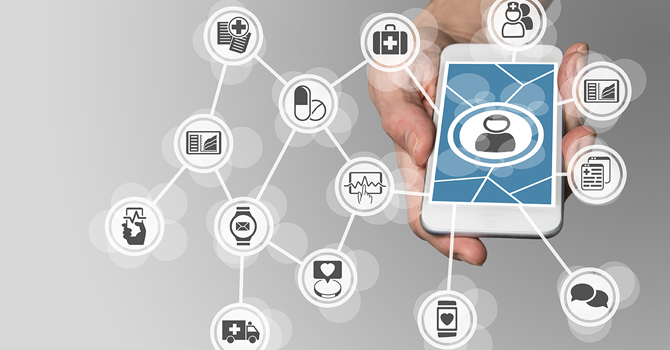The Future of Health Care Is Public Health

Quian Callender & Marianthi Hatzigeorgiou
Quian Callender, MHSA ’18 | Marianthi Hatzigeorgiou, MHSA ’18, Global Health Management and Policy
The idea of innovating in health care is far from novel. Journal articles and textbooks from past to present claim to know how to achieve disruptive innovation. But the application of these ideas remains largely theoretical, and many experts say health care has remained relatively unchanged in the last 40 years.
As graduates of the School of Public Health's Health Management and Policy program, we understand that innovations and disruptions will continue to impact health care and must be understood and managed in order to improve collaborations across the field of public health.
With bytes of data at our fingertips, why have we failed to use that data to understand consumer behavior patterns and truly change health care by driving down costs and improving the quality of our care?
With that concept in mind, we attended the inaugural HLTH (pronounced "health") conference in Las Vegas this May. Over 3,500 members of the global health care community attended the event, titled "The Future of Health Care." HLTH claims to be "the leading event for innovation in healthcare" and offered more than 100 panels and other presentations by health care leaders.
The title of our favorite session also summarized well the theme of the conference: "How is it that Bank of America knows where my aging mother is at all times, but Mass Gen doesn't?" With bytes of data at our fingertips, why have we failed to use that data to understand consumer behavior patterns and truly change health care by driving down costs and improving the quality of our care?
HLTH brought together ideas of innovation and disruption by asking us to consider how therapies, technologies, and retail companies can work together to advance patient experiences in health care. The prevailing response was that we modernize and adapt by learning from and reflecting other successful consumer-driven industries.
Much like public health itself, HLTH was an array of individuals with diverse experiences, interests, and passions that all fit under a coherent umbrella. Epidemiologists detailed existing technologies that can provide real-time data to patients. Physicians described their frustrations with clinical management and how they left full-time practices to pursue patient care in less-traditional settings. Policymakers and influencers like Patrick Kennedy, William Frist, and James Rice shared recommendations for today's health industry leaders to implement true change. Walmart's VP of Health Transformation explained his company's approach to the challenges of massive variation in care in the US.
Health care organizations and companies like Lyft, Google, and Samsung agreed that health care is becoming truly consumer-oriented. Serving patients from birth to death means addressing their lives outside the walls of hospitals and clinics. Two themes emerged in discussing this enormous transition:
1. Remove "health care" and return to "human." Multiple panels and speakers addressed frustrations with organizations that claim to be "patient-centric" but fail to keep consumer interests at the core of their operations.
2. Figure out what's preventing sustainable good health and act on it. We talk a lot about what is preventing sustainable change. Here we were asked to examine what actions have really taken place to remove those obstacles.
One solution is to encourage consumers—whenever they have the option—to pick the health plan that is truly consumer-centric, that truly adds value to their lives. "It's not about managed care, it's about managed life," said Rene Lerer, MD, president of Guidewell and panelist in the "Paying for Value: Proven ROIs and Strategies" session. "Individuals are taking more control of their health, which means we need to look at health care from an individual perspective," added Bob Sheehy, MHSA '81, CEO and cofounder of Bright Health.
With the focus on consumer-driven enterprises and new opportunities in technology, management, and sustainability, the future of health care looks a lot like public health.
We had a chance to speak with Sheehy after the panel and discussed the conference, career development, and the future of health care. His two-year-old, Minnesota-based company, Bright Health, is changing the landscape of health insurance.
He thinks students should pursue transformative opportunities and embrace diverse career development possibilities immediately. "There's no risk in doing something different. Find a company you're interested in and work there right after graduation, rather than following the traditional consulting and fellowship binary," he said.
We hope more Michigan Public Health students—and fellow alums—will take the time to attend next year's HLTH event. We believe it will give them a better understanding of what innovations are imminent, what those innovations mean for organizations and career opportunities, and how we can continue to collaborate and evolve to improve health care and delivery for all. With the focus on consumer-driven enterprises and new opportunities in technology, management, and sustainability, the future of health care looks a lot like public health.
The authors wish to thank the School of Public Health's Office of the Dean, Department of Health Management and Policy, Office for Student Engagement and Practice, and University of Michigan Summer Enrichment Program for supporting their participation in HLTH.
About the Authors
 Quian Callender completed a Master of Health Services Administration degree in Health
Management and Policy and a Graduate Certificate in Health Informatics in 2018. He
returned to his native Connecticut in May to join Hartford HealthCare in a dual role
as Administrative Fellow and Business Intelligence Analyst. During his graduate studies,
he worked at Michigan Medicine, was a graduate student instructor, and completed his
internship at Hartford HealthCare. Callender had previously spent time working at
Cleveland Clinic and the National Institutes of Health. He graduated from the University
of Connecticut in 2016 as an Honors Scholar with a Bachelor of Science in Healthcare
Management. Callender was in the 2014 cohort of the University of Michigan Summer Enrichment Program and remains actively involved with the program as an alum.
Quian Callender completed a Master of Health Services Administration degree in Health
Management and Policy and a Graduate Certificate in Health Informatics in 2018. He
returned to his native Connecticut in May to join Hartford HealthCare in a dual role
as Administrative Fellow and Business Intelligence Analyst. During his graduate studies,
he worked at Michigan Medicine, was a graduate student instructor, and completed his
internship at Hartford HealthCare. Callender had previously spent time working at
Cleveland Clinic and the National Institutes of Health. He graduated from the University
of Connecticut in 2016 as an Honors Scholar with a Bachelor of Science in Healthcare
Management. Callender was in the 2014 cohort of the University of Michigan Summer Enrichment Program and remains actively involved with the program as an alum.
 Marianthi Hatzigeorgiou completed a Master of Health Services Administration degree
in Global Health Management and Policy from the University of Michigan in 2018. She
joined Anne Arundel Medical Center in June as the Fiscal Year 2019 Administrative
Fellow. During graduate school, she worked at the University of Michigan Center for Value-Based Insurance Design and completed her internship at the global headquarters of Siemens Healthineers in
Erlangen, Germany. Hatzigeorgiou graduated from Indiana University in 2012 with a
Bachelor of Science in Neuroscience, a Bachelor of Arts in English, and a Bachelor
of Science in Human Biology with a concentration in Growth and Development. Before
returning to graduate school, she worked as a Program Supervisor at Parkview Health
in Fort Wayne, Indiana.
Marianthi Hatzigeorgiou completed a Master of Health Services Administration degree
in Global Health Management and Policy from the University of Michigan in 2018. She
joined Anne Arundel Medical Center in June as the Fiscal Year 2019 Administrative
Fellow. During graduate school, she worked at the University of Michigan Center for Value-Based Insurance Design and completed her internship at the global headquarters of Siemens Healthineers in
Erlangen, Germany. Hatzigeorgiou graduated from Indiana University in 2012 with a
Bachelor of Science in Neuroscience, a Bachelor of Arts in English, and a Bachelor
of Science in Human Biology with a concentration in Growth and Development. Before
returning to graduate school, she worked as a Program Supervisor at Parkview Health
in Fort Wayne, Indiana.
